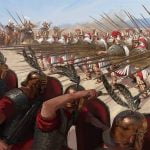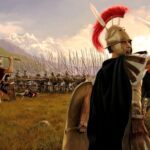Chapters
Lack of stability in Macedonia and the constant threat from barbarians led to the appearance of Andriscus, also known as the Fourth Macedonian War. This event had a major impact on the further political fate of Macedonia, after being defeated by Rome.
Background of events
The creation of four republics in place of the former Antigoneid kingdom did not, despite the Romans’ intentions, ensure peace in Macedonia. It was not free from internal disturbances, as part of the population did not like the order brought in by the Senate. Macedonians attached to the monarchy did not accept the republican system vaccinated in their country after defeating Perseus. In addition, residents of Macedonia who had no major military power did not feel safe against the attacks of barbarians from across the northern border. Andriscus decided to take advantage of this situation, whose speech, also known as the Fourth Macedonian War, had a great impact on the country’s further political fate.
Macedonia defeated by legions in 168 BCE was divided into four republics and deprived of the opportunity for economic development. This state became a source of unrest that occurred in the 60s of the 2nd century BCE. In 162 BCE, a certain Damassipos murdered selected officials (synhedroi) in Pella, although the real upheaval occurred in 151 BCE, when Andriscus, claiming to be Philip, son of Perseus. Little is known about its origin. Some claimed that he was the son of a dyer from Adrymattion in Asia Minor. Captured in Syria by its ruler Demetrios I, Andriscus was handed over to the Romans, however, he managed to escape, probably with the tacit consent of the senators themselves. After arriving in Macedonia, he did not win supporters and was expelled from the country. In Thrace, he gained the support of local rulers and at the head of Thracian warriors entered 149 BCE back to his homeland. In Macedonia he received the support of the lower social strata, and the elites took a loyal attitude to the Republic.
The first battle of Andriscus’ army took place over Strymon, where his army defeated the troops of the Macedonians who were militant, loyal to the local authorities. This success paved the way for him to conquer all of Macedonia within a few months. Andriscus made contact with the dying Carthage, whose representatives promised him money and ships in exchange for continuing the fight. Initially, the pseudo-Philip was disregarded in Rome, who even attacked Thessaly. Only Achaean and Pergameian troops led by Scipio Nazyki were sent to defend this region. When the Romans sent a small army commanded by Consul Juwentius Thalna to the Balkans, it was defeated by the warriors of Andriscus, and the Roman commander himself fell. It was a blow to the prestige of the senate, and the successes of the pseudo-Philip threatened the rule of Rome not only in Macedonia but also in Greek cities. Among them, the Achai were especially anti-Roman, who could obey the Republic at any time. To prevent this, in 148 BCE the army of Praetor Quintus Caecilius Metellus was sent to the Adriatic, who followed the routes of earlier legion marches, leading from Thessaly to Macedonia. Ironically, the clash with the hosts of Andriscus took place near the former battlefield at Pydna, where the Macedonian usurper defeated the Romans in the skirmish of the cavalry. However, there were disagreements around him, and some of the pseudo-Philip supporters deserted. The Macedonian leader divided his army into two parts, one of which was sent to Thessaly. The Roman commander easily dealt with both groups of enemy troops, and Andriscus fled to Thrace. After another unsuccessful attempt to enter Macedonia, he was released by the Thracians to the Romans and sent to the Tiber, where he went in the triumphal march of the Roman commander.
However, after Andriscus, other claimants – Alexander (148/146 BCE) and Philip (143/142 BCE) started to fight for the Macedonian throne. Both would-be kings sought sympathy for the lower classes of society, including slaves. Alexander gathered 1,600 people around him, but the Romans, led by Quaestor Tremmelius, stifled this rebellion in the bud and chased Alexander to Dardania. Philip’s followers also failed.
The defeat of Andriscus prompted the Romans to introduce a more direct form of control over the lands of the former Antigonid kingdom. In 146 BCE, a Roman province was created from four Macedonian republics, including Illyria and Epirus. It was headed by a governor in the rank of propretor or proconsul, supported by the Roman legion strengthened with Latin and Italian meals. The communication in the province was improved, which was served by the construction of the new communication artery via Egnatia, connecting the Adriatic port of Epidamnos with Thessalonike. The latter town became the capital of the new province. The goal of the new road may have been to facilitate the transfer of legions further east, but it was primarily to facilitate the maneuvers of the local garrison and its supply. Via Egnatia, completed around 120 BCE, stood the test of time and until the First World War was the only good way in these areas.
Little is known about the events in Macedonia in the next several decades of Roman rule. It is believed that from the provinces, actions against barbarian tribes, among others, were carried out with varying luck against barbarians i.e. Scordisci. They were not, however, extensive campaigns, covering areas located far beyond the borders of the province. Rather, they were of a nature of actions that responded to the invasions of tribes on its territory. Only a change in this matter will occur after the formation of the principate. Then the task of protecting the Balkan Peninsula against external attacks of tribes will be given to the governor of the newly formed province – Moesia.
It is significant that even during the Cimbri and the Teutones invasions a military garrison was maintained in Macedonia, and the consuls were sent to its territory for several years. The increased military activity in the province is evidenced by the fact that the Romans enacted the law in 102 BCE ordering the local governor to hold courts and deal with administrative matters for 60 days in Chersonesus next to the obligation to conduct war campaigns.
It seems that the creation of the province gained local people. Barriers between the former regions of this land have disappeared, created artificially after the pogrom of Perseus. Thus, the freedom of trade and movement of people throughout Macedonia increased. Roman governors also took on the duty to defend the northern border, although they did not have a large army. Another thing is that some governors committed rip-offs on people whose apogee fell during the civil wars in the first century BCE. Only the proclamation of the empire meant the curtailing of the greed of Roman governors because they were more closely controlled by the emperors.







